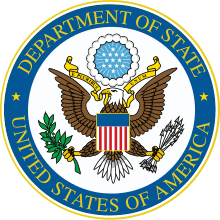United States Ambassador to Mozambique
| Ambassador of the United States to Mozambique | |
|---|---|
|
Seal of the United States Department of State | |
|
Incumbent Douglas M. Griffiths since August 3, 2012 | |
| Nominator | Barack Obama |
| Inaugural holder |
Willard A. De Pree as Ambassador Extraordinary and Plenipotentiary |
| Formation | February 4, 1976 |
| Website | U.S. Embassy - Maputo |
Mozambique was an overseas possession of Portugal until 1975. On June 25, 1975, Portugal granted independence to Mozambique, much later than other European nations had freed their own African possessions.
The United States immediately recognized the new nation and moved to establish diplomatic relations. An embassy in the capital Maputo (then named Lourenço Marques) was opened November 8, 1975, with Johnnie Carson as chargé d’affaires ad interim. On February 4, 1976, Ambassador Willard A. De Pree was appointed as Ambassador Extraordinary and Plenipotentiary to Mozambique.
On March 29, 2012, President Barack Obama, in a White House press release, officially nominated Douglas M. Griffiths to succeed Leslie V. Rowe as the U.S. Ambassador Extraordinary and Plenipotentiary to the Republic of Mozambique. Griffiths is a career member of the Senior Foreign Service and previously served as the U.S. Deputy Permanent Representative to the United Nations in Geneva, Switzerland.[1]
Ambassadors
U.S. diplomatic terms
After 1915, The United States Department of State began classifying ambassadors as career Foreign Service Officers (FSOs) for those who have served in the Foreign Service for a specified amount of time.
Political appointee
A person who is not a career foreign service officer, but is appointed by the president (often as a reward to political friends).
Appointed
The date that the ambassador took the oath of office; also known as “commissioning”. It follows confirmation of a presidential appointment by the Senate, or a Congressional-recess appointment by the president. In the case of a recess appointment, the ambassador requires subsequent confirmation by the Senate.
Presented credentials
The date that the ambassador presented his letter of credence to the head of state or appropriate authority of the receiving nation. At this time the ambassador officially becomes the representative of his country. This would normally occur a short time after the ambassador’s arrival on station. The host nation may reject the ambassador by not receiving the ambassador’s letter, but this occurs only rarely.
Terminated mission
Usually the date that the ambassador left the country. In some cases a letter of recall is presented, ending the ambassador’s commission, either as a means of diplomatic protest or because the diplomat is being reassigned elsewhere and replaced by another envoy.
Chargé d'affaires
The person in charge of the business of the embassy when there is no ambassador commissioned to the host country. See chargé d'affaires.
Ad interim
Latin phrase meaning "for the time being", "in the meantime". See ad interim.
- Willard A. De Pree – Career FSO
- Title: Ambassador Extraordinary and Plenipotentiary
- Appointed: February 4, 1976
- Presented credentials: April 16, 1976
- Terminated mission: Left post, July 7, 1980
- David E. Simcox – Career FSO[2]
- Title: Ambassador Extraordinary and Plenipotentiary
- Appointed:
- Presented credentials:
- Terminated mission:
- Note: The post was vacant from July 7, 1980 until September 23, 1983. William H. Twaddell served as chargé d’affaires ad interim during that period.
- Peter Jon de Vos – Career FSO
- Title: Ambassador Extraordinary and Plenipotentiary
- Appointed: September 23, 1983
- Presented credentials: November 4, 1983
- Terminated mission: Left post, February 12, 1987
- Melissa Foelsch Wells – Career FSO[3]
- Title: Ambassador Extraordinary and Plenipotentiary
- Appointed: September 11, 1987
- Presented credentials: September 26, 1987
- Terminated mission: Left post, October 12, 1990
- Townsend B. Friedman, Jr. – Career FSO
- Title: Ambassador Extraordinary and Plenipotentiary
- Appointed: August 6, 1990
- Presented credentials: November 10, 1990
- Terminated mission: Left post, September 15, 1993
- Dennis C. Jett – Career FSO
- Title: Ambassador Extraordinary and Plenipotentiary
- Appointed: July 16, 1993
- Presented credentials: November 17, 1993
- Terminated mission: Left post, July 20, 1996
- The post was vacant between July 20, 1996 and December 3, 1997. P. Michael McKinley served as chargé d’affaires ad interim during that period.
- Brian D. Curran – Career FSO
- Title: Ambassador Extraordinary and Plenipotentiary
- Appointed: October 24, 1997
- Presented credentials: December 3, 1997
- Terminated mission: Left post June 21, 2000
- Sharon P. Wilkinson – Career FSO
- Title: Ambassador Extraordinary and Plenipotentiary
- Appointed: September 15, 2000
- Presented credentials: October 25, 2000
- Terminated mission: Left post July 21, 2003
- Helen R. Meagher La Lime – Career FSO
- Title: Ambassador Extraordinary and Plenipotentiary
- Appointed: April 16, 2003
- Presented credentials: September 3, 2003
- Terminated mission: December 2006
- The post was vacant 2006–09. Todd C. Chapman served as Chargé d’Affaires.
- William R. Steiger was nominated by President Bush on January 10, 2007, but the Senate did not on the nomination.
- Leslie V. Rowe - Career FSO
- Title: Ambassador Extraordinary and Plenipotentiary
- Appointed: September 12, 2009
- Presented credentials: January 28, 2010
- Terminated mission: Incumbent
Notes
- ↑ http://www.whitehouse.gov/the-press-office/2012/03/29/president-obama-announces-more-key-administration-posts
- ↑ Simcox was not commissioned. His nomination not acted upon by the Senate.
- ↑ An earlier nomination of October 7, 1986, was not acted upon by the Senate.
See also
- Mozambique – United States relations
- Foreign relations of Mozambique
- Ambassadors of the United States
Sources
- United States Department of State: Background notes on Mozambique
 This article incorporates public domain material from the United States Department of State website http://www.state.gov/r/pa/ei/bgn/index.htm (Background Notes).
This article incorporates public domain material from the United States Department of State website http://www.state.gov/r/pa/ei/bgn/index.htm (Background Notes).
External links
- United States Department of State: Chiefs of Mission for Mozambique
- United States Department of State: Mozambique
- United States Embassy in Maputo

